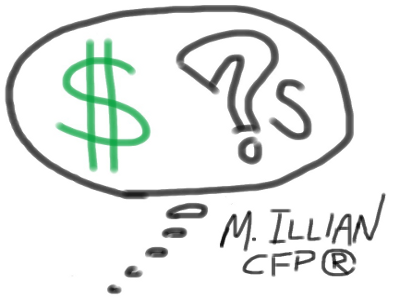Q: I am 64 years old, married with a young child. In addition to my Social Security benefit, we also receive a spousal and a child benefit. My consulting work is picking up, and it looks like I will be over the earnings limit. What will be the impact on our Social Security checks?
Sincerely, Earning More
$ ?s answered by Matthew Illian, CFP®
Dear Earning More,
The excess earnings test impacts those who are receiving family benefits the most. Despite being told on the Social Security website that you will lose benefits, those who go back to work will earn a higher benefit in the future and will make up for their penalized earnings. However, some benefits are lost for good, and so it is important to understand the rules.
For 2012, the excess earnings penalty gets applied to any earnings over $14,640. This penalty only applies to those who claim benefits before reaching their full retirement age (FRA), which is age 66 for current retirees. After FRA, you can earn a million bucks without affecting your Social Security paycheck. From age 62 to age 65, your Social Security checks will get reduced $1 for every $2 over the limit. In the year you turn age 66, your checks will be reduced $1 for every $3 over the limit.
This earnings test only applies to salary or self-employment income. It does not apply to income from pensions, rents, dividends, interest, or other types of so-called unearned income.
If I assume you are earning $30,000 from your consulting business, you are $15,360 over the earnings limit. Because 50 cents of each dollar earned is penalized, you would have a $7,680 penalty. This penalty is applied pro rata to all the family members receiving benefits.
Assume with me that your Social Security benefit is $1,600, your spouse’s benefit is $900, and your child’s benefit is $900 for a total family benefit of $3,400. In this case, the penalty would be applied as follows:
Your penalty = $1,600/$3,400 × $7,680 = $3,614
Spouse’s penalty = $900/$3,400 × $7,680 = $2,032
Child’s penalty = $900/$3,400 × $7,680 = $2,032
Social Security charges you these penalties as soon as it becomes aware of the excess. This means you will not receive any monthly payment from Social Security for several months until the entire penalty have been repaid.
But don’t hold your breath while waiting for the penalty to kick in. For self-employed workers, Social Security depends on the most recent federal tax return to prove the income. This means that excess earnings in 2012 will not get reported until as late as October 2013 for those who file an extension, and this information may not trickle down to Social Security until early 2014. You may want to inform Social Security of your higher earnings if you prefer to pay this penalty earlier rather than later.
The good news is that you can recoup these lost benefits. Any months that some of your benefits are withheld because of excess earnings, your benefits will be increased starting at your FRA. I estimate that it typically takes about seven years to recoup lost benefits with a higher monthly payment.
Your wife’s breakeven point may be much longer. To understand why this is the case, you need to know there is a distinction in the Social Security system between mother’s benefit and spousal benefit. The former benefit gets paid when a dependent child is also eligible for benefits. For example, if your son is age 16 and your wife is age 60, she will be eligible for mother’s benefits.
Spousal benefits are only available beginning at age 62, and they are no more, and often less, than mother’s benefits. Although the spousal benefit can be adjusted higher with the retired worker’s benefit, the mother’s benefit (or father’s benefit if the roles are reversed) is lost forever in the case of excess earnings.
Similarly, the benefits for a dependent child are not recouped at all. For these reasons, you may want to delay your earnings until your child is no longer eligible for benefits, which will be through the earlier of either age 19 or graduation from high school.
If you have a money question that is nagging at you, please submit it using our contact page, http://www.marottaonmoney.com/contact. We try to respond to every question. If yours is chosen for MONEY QUESTIONS, we will give you a pseudonym and let you know the date the Q&A is published.
